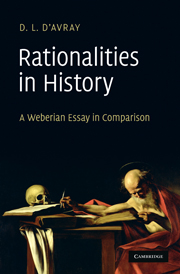Book contents
- Frontmatter
- Contents
- Preface and acknowledgements
- Introduction
- 1 Universal and specific rationalities: theories
- 2 The structure of values and convictions
- 3 Dynamics of values and convictions
- 4 The instrumental–conviction rationality interface
- 5 Formal rationality
- 6 The formal–substantive interface
- Conclusions
- Appendix: rationalities in a case before the Congregation of the Council
- Bibliography
- Index
Preface and acknowledgements
Published online by Cambridge University Press: 05 June 2012
- Frontmatter
- Contents
- Preface and acknowledgements
- Introduction
- 1 Universal and specific rationalities: theories
- 2 The structure of values and convictions
- 3 Dynamics of values and convictions
- 4 The instrumental–conviction rationality interface
- 5 Formal rationality
- 6 The formal–substantive interface
- Conclusions
- Appendix: rationalities in a case before the Congregation of the Council
- Bibliography
- Index
Summary
A series of courses at UCL lie behind this book: a course consisting mostly of social theory which kind colleagues allowed me to teach to MA students in the mid-nineties, during which I became convinced by Max Weber's approach, another on ‘Weber for historians’, and above all the ‘History and Sociology of Rationality’, for undergraduates. The capacity of the latter to understand and criticise constructively suggests that a book that came out of that course could be comprehensible even to students and scholars normally allergic to social theory. More theoretically inclined colleagues may actually find the book harder, if they try to force it into familiar schemata. The best way to read Rationalities in History would in fact be to approach it with a clever undergraduate's open-mindedness.
For anyone who ends up in sympathy with the approach, a natural sequel is the sister volume, Medieval Religious Rationalities, in which the sociology of rationality is applied in a more concentrated form to a particular field. The two books are closely linked. The present volume outlines the general social forms explored for a specific period in Medieval Religious Rationalities. Astute readers will observe that the books have parallel structures.
Information
- Type
- Chapter
- Information
- Rationalities in HistoryA Weberian Essay in Comparison, pp. ix - xPublisher: Cambridge University PressPrint publication year: 2010
